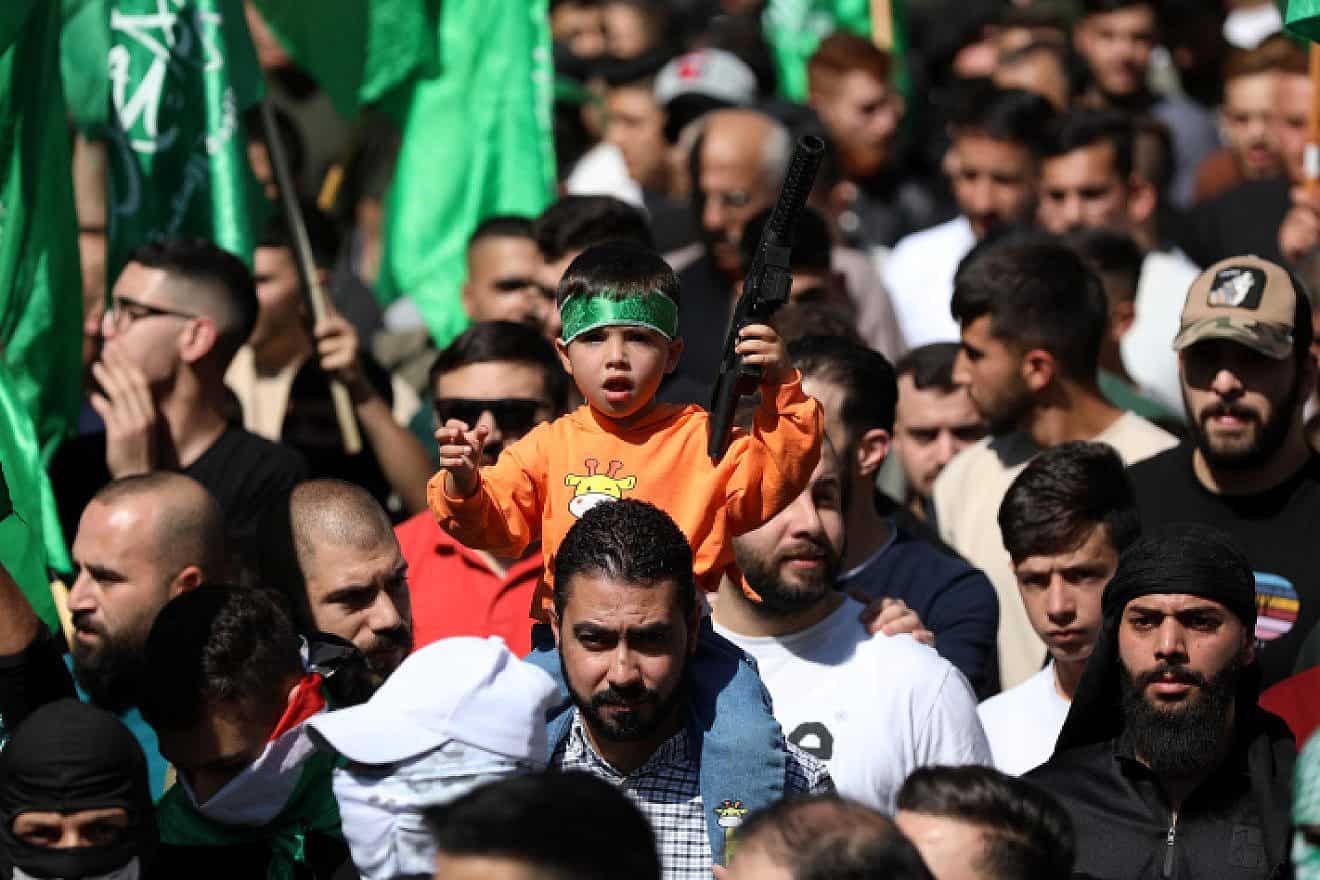by Douglas Altabef
No game, set, match. Hamas is buying time to enable its terror organization to regroup and re-establish itself.
 |
Palestinians march during a pro-Hamas protest in Hebron on Oct. 13, 2023. Photo by Wisam Hashlamoun/Flash90. |
A recent poll of Palestinians in Judea and the Shomron, reported by Gatestone Institute journalist Khaled Abu Toameh, should provide a cold-water shower for those who were extrapolating even greater things coming from the undeniably amazing achievement of a ceasefire deal that saw the release of all of Israel’s living hostages.
The poll findings show durable support for Hamas and overwhelming approval for its massacre in southern Israel on Oct. 7. No remorse, no turning of the page, no lessons learned. Even worse, no interest in disarming Hamas.
The refusal of Palestinian Authority leader Mahmoud Abbas to hold elections in the P.A. for the past 20 years was explained by the findings, which showed a massive preference for Hamas and its leadership over Abbas and the Fatah Party.
As Toameh observes, Arab leaders in the region will think twice about signing up for the glorious peace framework anticipated by the 20-point Trump ceasefire/rebuilding/Mideast peace plan. One example of that reluctance is the reticence of Arab countries to participate in a Gaza peacekeeping force.
The real question concerns Israel: Will it be the only country in the Middle East that doesn’t read the memo as to how the ground has not necessarily shifted beneath our feet? In other words, if Israelis are lulled into a belief or a path led by the belief that the world has changed, opting for peace and economic development, then we are merely replacing the pre-Oct. 7 conceptzia with a post-war version that seems all too reminiscent.
Through force of arms, resolve, tenacity and the willingness to unleash unprecedented might, Israel was able to neuter not just Hamas, but also Hezbollah, Syria, and most tellingly, Iran.
Still, as the poll hints at, and recent actions corroborate, things change, but they don’t really change. Iran is rearming, as is Hezbollah. Hamas is delaying the other headline achievement of the Trump plan by not returning all of Israel’s dead to buy time to enable the terror group to re-establish itself.
There was no game, set, match. These were powerful setbacks to be sure, but not the kind that lead to a new future, either within a country or vis-à-vis Israel.
We have already seen examples of how U.S. President Donald Trump and his administration, heavily invested in his plan, have restricted Israel’s movement and compelled it to stand down from more aggressive activity. While these have not been cataclysmic in and of themselves, they bespeak a modus operandi taking shape in which Israel is under American constraints in the name of preserving the peace plan and its direction.
When Israeli Prime Minister Benjamin Netanyahu and U.S. Vice President JD Vance both opine that Israel is not becoming a vassal state of the United States, we should be worried. Such statements would never be made were there no concerns to the contrary.
Having said that, we need not have buyer’s remorse about the Trump plan. The issue of our hostages has been an existential one for us, and it demonstrates the innate morality of our people. Bringing home the living hostages was the closing of a festering wound, and the retrieval of the dead, though not yet complete, has allowed most everyone in Israel, even those habitually critical of the government, to shift the focus and the burden of accountability onto Hamas.
Nevertheless, we should not confuse the willingness of Hamas to take an important step with its complicity in its own diminution, not to mention its dismantlement. In other words, we need to reappraise the motivation of Hamas to release the hostages.
What was once seen as irreplaceable leverage must now be viewed as a stratagem that outlived its usefulness. And usefulness continues to be the name of the game for Hamas. They are not going quietly into the night.
While Trump sees Hamas and Gaza as a secondary irritant and distraction from the great development and cooperative arrangements he envisions in the region, we know that Hamas cannot be dismissed nor sidelined into irrelevance.
Hamas continues to have the desire and the potential to inflict great harm on Israel, and it has the continued ability to attract supporters and allies. While Trump can minimize, rationalize or explain away Hamas’s continuing efforts to live to fight another day, we do not have that luxury.
We not only owe a debt of loyalty to our hostages; we owe a profound debt of gratitude and honor to our soldiers, especially those who paid the highest price for their bravery.
We owe it to them, to ourselves and to those whom we are rearing to follow in the hallowed footsteps of their predecessors to be clearheaded and free of Pollyannaish delusions.
There is nothing at all wrong with Israel pursuing new relationships and opportunities to create détente. Such aspirations, however, cannot come at the expense of minimizing, dismissing, or, God forbid, ignoring the unchanged reality of those who continue to harbor only the desire to destroy us.
In the Middle East, success goes to the strong horse and to the clear-eyed horse. Israel needs to be both.
Douglas Altabef is chairman of the board of Im Tirtzu and a director of the Israel Independence Fund. He can be reached at: dougaltabef@gmail.com.
Source: https://www.jns.org/disarming-hamas-is-not-a-palestinian-priority/
No comments:
Post a Comment